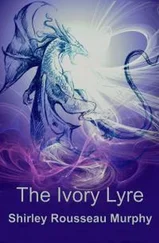Juana’s dark eyes smiled down at Joe, and she scratched his ears. Her black hair had just been cut, straight black bangs, smooth black bob above her collar, a few streaks of gray that gave it a nice flair. Her black uniform smelled of her two young cats. Max Harper’s western shirt and jeans smelled of horses. Across the desk, Dallas Garza looked at Joe with interest just as Max was looking, Dallas’s dark Latin eyes half amused, half questioning. “Why do you always show up when new information has just hit the desk?”
“Leave the poor cat alone,” Juana said. “Look how frazzled he is, he’s probably been out half the night hunting for his kitten. Looks like the whole village is looking for her.”
“Not the whole village,” Dallas said, reaching to pet Joe. “Though there are a lot of people wandering around and looking in windows. I know Joe’s bright, but to hunt for hours for his lost kitten?” He looked up at Detective Davis. “Hell, Juana, she’ll show up.”
Pretending ignorance, Joe stepped delicately around Max’s assorted papers, onto the edges of camera views and X-rays of the robbery victim’s injured head, of his bloody neck and shoulder. That whole upper part of his body had been hit when the thief slammed the door on him, grisly color shots of blood and crushed bone. The victim’s foot and leg were twisted and looked broken. The coroner’s written report lay right in front of him, facing Max. Joe would have to read it upside down, but he didn’t think that would fly. A cat reading right side up, nose to the page, would be incriminating enough. He caught the name, Jon Jaarel. Jaarel’s charming bar and grill had been a Molena Point landmark for years. Now Jaarel was gone, Joe thought sadly. And would the treasured restaurant soon vanish, too?
“The killer must have thrown all his weight against that door,” Dallas said.
For some reason, Joe had the strange feeling that when the robber slammed the car door, he didn’t mean to kill Jaarel. A man so eager for the money that he did in his victim with more speed than thought, striking fast but clumsily.
And who was the witness, the unknown snitch who had called Max?
Max’s careful notes were there. The snitch had given him a more detailed description of the crime than Joe himself usually gave—yet this snitch had offered little to describe the killer, he said he hardly saw the man.
Well, Joe’s own tips were often just as disjointed: details left out or confused in the fast action of the crime. A witness couldn’t catch everything. And how could the killer vanish so quickly in that small, crowded shopping center?
But Max and Juana Davis were talking about what to do with Joe’s own case, as he thought of it. Whether to transfer the woman from the hospital to a nursing home where she could rest and heal, under police guard, when Kit came bolting in through Max’s door, wild-eyed. Joe crouched to leap down. Had she found Courtney? Had something terrible happened? She could say nothing until he’d raced out behind her, until they’d bolted to the roof and were alone, Joe nervous with worst-case scenarios.
In the office behind them Harper, Davis, and Garza stared after the cats, uncomfortably puzzled. “Cats,” Dallas said. “Flighty as a drunk squirrel.”
Juana smiled indulgently, thinking of her own cats. “Who knows what’s in their minds?”
Max’s expression didn’t change, no one knew what he was thinking.
9
It was Kit who found Courtney, who came bolting down the sidewalk and in through the door of MPPD dodging two cops coming out. Ignoring EvaJean, she fled into Max’s office following Joe’s scent, so excited she could hardly help but shout out the whole story.
She had, searching for the calico, coming along the alley behind Seaver’s Antiques, stopped suddenly and sniffed at the garbage truck that was idling there as two men dumped the week’s collection. The back of the building had carved molding, and the front of the two-story structure facing the street was even more ornate: fancily decorated framing all along the windows and above the shop’s wide glass door. Maybe the building was Victorian or maybe a mix of styles, but it seemed to fit the village. Kit stood inhaling the violent stink of garbage—but then sharply above that odor she caught the sweet scent of Courtney. Every cat has his own aroma, there was no doubt the calico was here, or had been. Staring into the truck’s open tailgate, she was gripped by fear. Was Courtney in there among the trash, and hurt? Had she been picked up by accident, too injured to leap away or cry out?
Kit climbed up to look in, feeling sick at the thoughts that filled her. She turned to look for Dulcie who was down the alley behind her. She mewed, calling her, asking for help, she felt sicker as the men continued emptying trash cans and Courtney’s scent came stronger.
Yes, it was from one of the cans. She dodged the empty bin as they tossed it down. It bounced twice and nearly hit her, rolled across the alley and hit the brick wall of the building on the other side. She approached the can warily, stuck her head in and sniffed again.
She could see kitty litter clinging to the can’s sides where someone had emptied Courtney’s cat box. She whirled around and meowed again. Dulcie had paused to scent at a garage door; she looked up at Kit, raced to the truck, and now she got a full whiff of Courtney. At the same moment they heard a noise from above, a sound like claws on glass.
The men were getting back in the truck.
Before they could drive away Dulcie shouldered Kit aside and leaped to the truck’s hot hood, scorching her paws: the scratching from above came louder. Dulcie jumped from the hood to the top of the closed cab, Kit right behind her, as the truck began to move.
“Damn cats,” said the driver, “cats all over this town.”
Above, through the apartment window, the flash of white and orange was still wildly clawing.
Hearts pounding, they flew from the truck across space to the wide, decorative ledge that ran beneath the second-floor windows, its concrete curlicues embellished with pigeon droppings. Courtney peered out at them, her busy paws raking glass, her amber eyes flashing. The iron frames that bound the windows looked as solid as an iron safe.
“We need Joe,”Kit said, “we need help.”
Dulcie rubbed her face against the glass, loving her child, as Kit raced away across the rooftops for where she’d last seen Joe Grey. There she dropped down the twisted oak and in through the glass door behind a pair of cops, ignoring EvaJean, praying Joe was there. Yes, she followed Joe’s fresh scent, ignoring EvaJean’s tirade. When she burst into Max’s office, the tomcat knew by her expression that she’d found Courtney. He leaped down from the desk and they fled the station—glass door, oak tree, courthouse roof—and raced six blocks of jagged peaks headed for the antiques shop, Joe Grey hissing, “Where is she? Where is Courtney, and where is Dulcie?”
“Dulcie’s with her. I don’t know where Pan is, hunting for her somewhere.” That was all she had the breath to say.
By the time Kit and Joe reached Seaver’s Antiques, Courtney had moved along the inside of the upstairs windows to the front of the building. On the outside, on the ledge, Dulcie followed, the two together trying every window. Maybe Courtney had already tried them, alone, while Seaver was downstairs in the shop; Joe could hear customers down there. Joe was so glad to see Courtney he almost yowled. But as he tried to help them loosen a slider, the attempt seemed useless, those windows looked like they didn’t open at all, looked like they’d been installed to stay forever. They tried another and another, but nothing gave.
Читать дальше
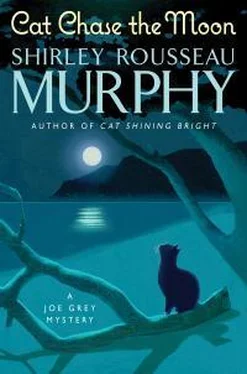
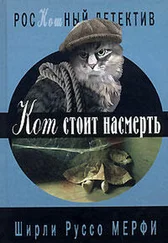
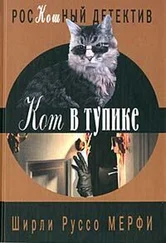
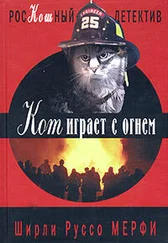


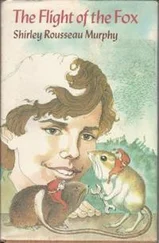

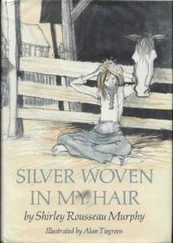
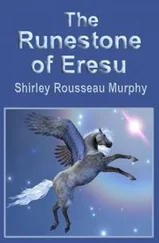
![Ширли Мерфи - The Shattered Stone [calibre]](/books/436059/shirli-merfi-the-shattered-stone-calibre-thumb.webp)

